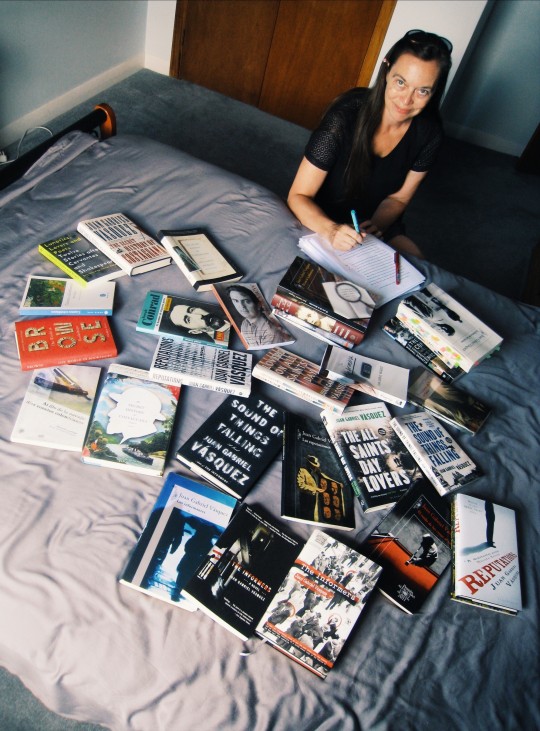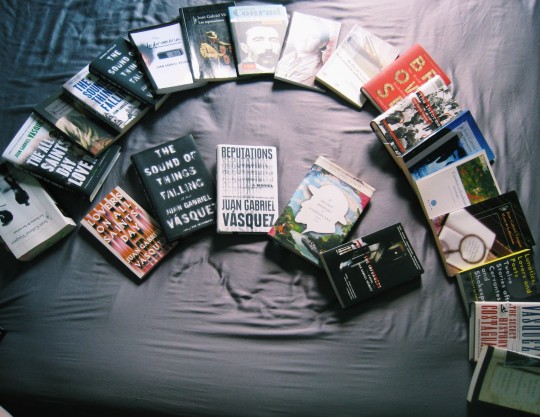#Premio Valle Inclán Prize
Link
The TA First Translation Prize Winner: Janet Hong and her editor Ethan Nosowsky for a translation of The Impossible Fairytale by Han Yujoo (Tilted Axis Press) translated from Korean.
The John Florio Prize Winner: Gini Alhadeff for her translation of I Am the Brother of XX by Fleur Jaeggy (And Other Stories).
The Scott Moncrieff Prize Winner: Sophie Yanow for her translation of Pretending is Lying by Dominique Goblet (New York Review Comics).
The Bernard Shaw Prize Winner: Frank Perry for his translation of Bret Easton Ellis and the Other Dogs by Lina Wolff (And Other Stories).
The Premio Valle Inclán Prize Winner: Megan McDowell for her translation of Seeing Red by Lina Meruane (Atlantic).
#TA first translation prize#John Florio Prize#Scott Moncrieff Prize#Bernard Shaw Prize#Premio Valle Inclán Prize#janet hong#han yujoo#tilted axis press#Korean Literature#gini alhadeff#fleur jaeggy#and other stories#sophie yanow#dominique goblet#new york review comics#frank perry#lina wolff#Megan McDowell#lina meruane#atlantic#womenintranslation
2 notes
·
View notes
Text
Women in Translation: Anne McLean
Our final #WITmonth interview is with Anne McLean, who has translated each one of Colombian author Juan Gabriel Vásquez’s books. Anne has twice won both the Independent Foreign Fiction Prize and the Premio Valle-Inclán, and she received the International IMPAC Dublin Literary Award with Juan Gabriel Vásquez for The Sound of Things Falling. We spoke to Anne about what it’s like working with Juan, why translating is similar to acting, and what she’s excited to read next!

Riverhead Books: You’ve translated all of Juan Gabriel Vásquez’s books. What is the most exciting aspect about translating his work, and what in your opinion has been the biggest challenge?
Anne McLean: One of the things I find with translating literature is that although I struggle word by word, phrase by phrase, sentence by sentence, trying to convey as many components of the Spanish prose into English (and I have to make a lot of decisions as I go along, and some of these are quite challenging and I tend to change my mind, there is also a lot of intuitive, unconscious decision-making going on), once I find the voice and rhythm of a particular piece of prose, I feel there are more moments of excitement than challenges, though I suspect it's just that I unconsciously choose to forget the struggles.
Of course, Juan is male and Colombian, tall and young, and many other things that I am not. So sometimes I find myself surprised or even shocked by things his characters do or say, though it’s quite possible they surprise him too. His fiction isn’t overtly autobiographical (though Javier Cercas says all fiction is autobiography and all autobiography is fiction). But that is also one of the pleasures of translating, which is similar to acting, or reading, when you get to live other lives and experience selves you would otherwise have no access to.
RB: Briefly explain your process of translating a book, from when a project is first presented to you to when the final version goes to print. How closely do you work with authors?
AM: I don’t think I can do that briefly, and I think I have done so at length elsewhere, so how ‘bout if I just answer the second half of your question?
I work quite closely with many of the authors I translate. Not all authors want to be consulted by or involved with their translators, especially if they have no knowledge of the language their book is going into, or if it's being translated into dozens of languages at the same time, which is perfectly understandable. Quite a few of my authors are actually interested in translation and in the English version of their books, but almost never in an overbearing way. Due to the peripatetic and unruly way I learned Spanish, I do tend to ask quite a few questions. I began to learn the language in Mexico, Central America and Spain in the early ’90s, while reading a fair bit of South American literature, first in English translations and gradually in the originals, and Spanish has some pretty distinct regional variations. Anyway, many years later, when Ignacio Martínez de Pisón gave me a copy Los Informantes, and introduced me to its author, I thought it was going to be fairly straightforward to translate. But when I started working on it, I realized how Colombian a lot of the vocabulary was. So a few emails were exchanged over the course of that year, and I probably asked Juan more questions than I needed to, but I think it’s better to ask than to guess, though you don’t always have to ask the author.

RB: What about a book appeals to you that makes you want to translate it?
AM: I've translated lots of different kinds of books, mainly books that I'm keen to share and talk about and widen the pool of people able to read and discuss a book that has hit me on some level.
RB: Is there a newly released or forthcoming translated book (either one you’re working on or one you’ve heard about) that you’re particularly excited about?
AM: I'm very excited about the new Javier Cercas novel, El Monarca de las Sombras. I think it's a sort of companion piece to Soldiers of Salamis, which I translated a decade and a half ago, and I’m looking forward to returning to his obsessions and landscapes, having spent quite a while immersed in Colombian landscapes and obsessions lately.
Hoping I’m allowed more than one…
I was very impressed by Samanta Schweblin's Fever Dream and am looking forward to Things We Lost in the Fire by Mariana Enríquez, both translated by Megan McDowell. In the more distant future, I've just read a brilliant collection of short stories called Seres Queridos, which might be called Loved Ones when it comes out in English, by Uruguayan-born Buenos Aires-based writer Vera Giaconi. Not yet translated, I'm sure this outstanding book will soon find a publisher in the English-speaking world.
The book I've been buying multiple copies of lately is Claude Ponti's My Valley, beautifully translated by Alyson Waters and gorgeously published by the new archipelago imprint Elsewhere Editions.
I'm also looking forward to reading Maja Haderlap's Angel of Oblivion translated by Tess Lewis. A year or so ago, one of her (their) poems appeared in Words Without Borders and several poet and translator friends of mine got slightly obsessed with it.
8 notes
·
View notes
Photo



This year's Premio Valle Inclán Prize, awarded by the Society of Authors (London) to the best English translation of a full-length Spanish-language literary work, has gone to Megan McDowell for her translation of Seeing Red by Lina Meruane (Atlantic).
The judges said:
Seeing Red raises difficult questions about the line between love, pity, and sacrifice. Yet, there is a strain of dark humour running through the novel, including word play which rewards multiple readings. The distinctive style of the novel evokes Lina’s trauma, with sentences cut off mid-thought. Translator Megan McDowell expertly captures Meruane’s voice, making the brave decision not to make the text easier for an English reader.
Read more about it here.
#premio valle inclán#society of authors#Megan McDowell#lina meruane#spanish-language literature#womenintranslation
2 notes
·
View notes